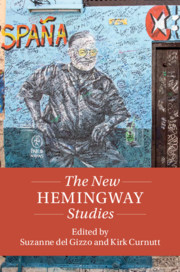Book contents
- The New Hemingway Studies
- Twenty-First-Century Critical Revisions
- The New Hemingway Studies
- Copyright page
- Contents
- Contributors
- Introduction Hemingway in the New Millennium
- Part I The Textual Hemingway
- Part II Identities
- Chapter 6 Family Dynamics and Redefinitions of “Papa”-hood
- Chapter 7 Hemingway and Pleasure
- Chapter 8 Trauma Studies
- Chapter 9 Hemingway and Queer Studies
- Chapter 10 Hemingway, Race(ism), and Criticism
- Chapter 11 Still Famous after All These Years
- Part III Global Engagements
- Works Cited
- Index
Chapter 9 - Hemingway and Queer Studies
from Part II - Identities
Published online by Cambridge University Press: 30 August 2020
- The New Hemingway Studies
- Twenty-First-Century Critical Revisions
- The New Hemingway Studies
- Copyright page
- Contents
- Contributors
- Introduction Hemingway in the New Millennium
- Part I The Textual Hemingway
- Part II Identities
- Chapter 6 Family Dynamics and Redefinitions of “Papa”-hood
- Chapter 7 Hemingway and Pleasure
- Chapter 8 Trauma Studies
- Chapter 9 Hemingway and Queer Studies
- Chapter 10 Hemingway, Race(ism), and Criticism
- Chapter 11 Still Famous after All These Years
- Part III Global Engagements
- Works Cited
- Index
Summary
In “Queer Studies,” Debra A. Moddelmog examines the way the maturing field of queer studies has proven a good fit for studying Hemingway and his multifaceted, intersectional explorations of about sexuality, gender, sexual practices, and their intersections with race, class, ability, and nationality. Moddelmog demonstrates that radical changes in Hemingway scholarship around issues of gender and sexuality as well as the studies of his interest in sexology introduced a Hemingway that challenged the iconic masculine persona. Beginning in the 1990s, critics such as Mark Spilka, J. Gerald Kennedy, Carl P. Eby, and Moddelmog herself began examining Hemingway’s newly revealed fascination with androgyny and sexual experimentation. That interest in the new millenium has given way to a richer understanding of the relationship between identity and sexuality, with “queer” and “trans” coming to mean not deviation but exploration from heteronormative standards. Moddelmog argues in particular that sexologist Havelock Ellis provides a useful mirror for redefining Hemingway’s desires, both biographical and in his writing.
- Type
- Chapter
- Information
- The New Hemingway Studies , pp. 146 - 160Publisher: Cambridge University PressPrint publication year: 2020

